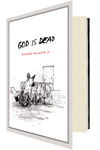In Ron Currie Jr.’s debut, God comes to earth in the form of a Dinka woman “to observe firsthand the armed conflict between Sudan’s Islamic government and the Christian Nuer tribe in the south” but gets eaten by dogs in the process. By describing the void this death creates in the world at large, Currie’s novel both participates in and skewers a century-old artistic tradition. Nietzsche wasn’t the first to announce the kicking of the heavenly bucket, but his famous obituary of God still finds expression in every manner of public discourse, from contemporary literature to the fundamentalism poisoning our current political rhetoric. In the newly secularized world—that is, in the perceived absence of a divine moral authority—many thinkers have struggled to find a new kind of meaning; that moral vacuum created by the death of God has enabled every manner of atrocity and caused our greatest artists to look elsewhere for inspiration. What they have found in the place of God, I would argue, is the absurd. It wasn’t enough, remember, for Gregor Samsa to be like a bug—he literally became one. Think of Max von Sydow playing chess with Death on the beach in Bergman’s The Seventh Seal or the Grinch’s small heart that grew three sizes that day. The literalization of the figurative has become the most reliable trope for our new secular aesthetic, and it’s one that Currie uses to great effect.
Try not to get hung up on definitions like “novel” or “story collection,” as they won’t help you here. The nine separate, stand-alone stories in God Is Dead feature different narrators and characters coming to grips with God’s demise. They seesaw between perfectly timed humor and the darkest despair. The title story features a grumpy and profane Colin Powell, who meets God’s bodily incarnation while on a humanitarian visit to Africa. When he returns home, Powell abandons God and all of the Dinka to the oncoming sectarian violence: “Time and again the people still in the camp, realizing they were now trapped, called to God in a hundred different dialects. He laughed and cried at once. He had so many names, yet could not answer to any of them.” “The Bridge,” set immediately after the announcement of God’s death, is the loveliest and most disturbing story here. The existential dread drips from every page. “Indian Summer,” about some kids’ post-apocalyptic suicide pact, begins, “There were ten of us, eight if you didn’t count the two in the middle of the living room holding pistols to each other’s heads.”
Although formal experimentation sometimes substitutes for real storytelling, the sections where Currie takes a more subtle approach and appears willing to trust his considerable talents, such as in the amazing “My Brother the Murderer,” make up for the occasional brief slippage of narrative tension. In that story, a man decides to confront the mentally ill brother recently convicted of killing people with a statuette of the Virgin Mary. It’s beautiful and profound and stands as the obvious highlight of an extraordinary book. Few authors would dare to depict the near rape and death of God amid a horrendous genocidal war, and fewer still could make it so bladder-threateningly hilarious. Although there’s genuine sadness throughout, God Is Dead is very likely the most entertaining book ever written on the subject of deicide.





